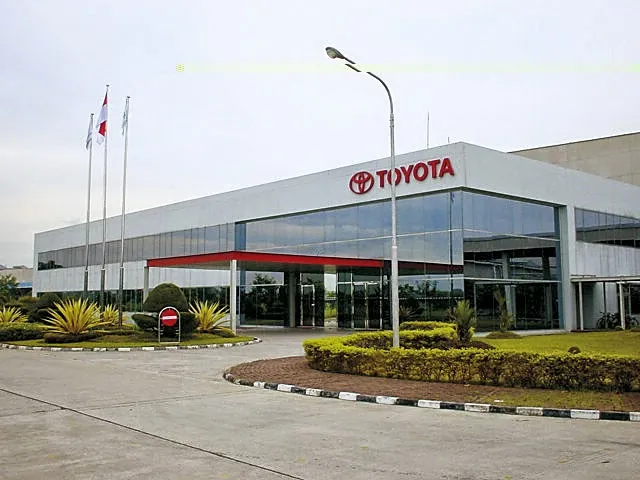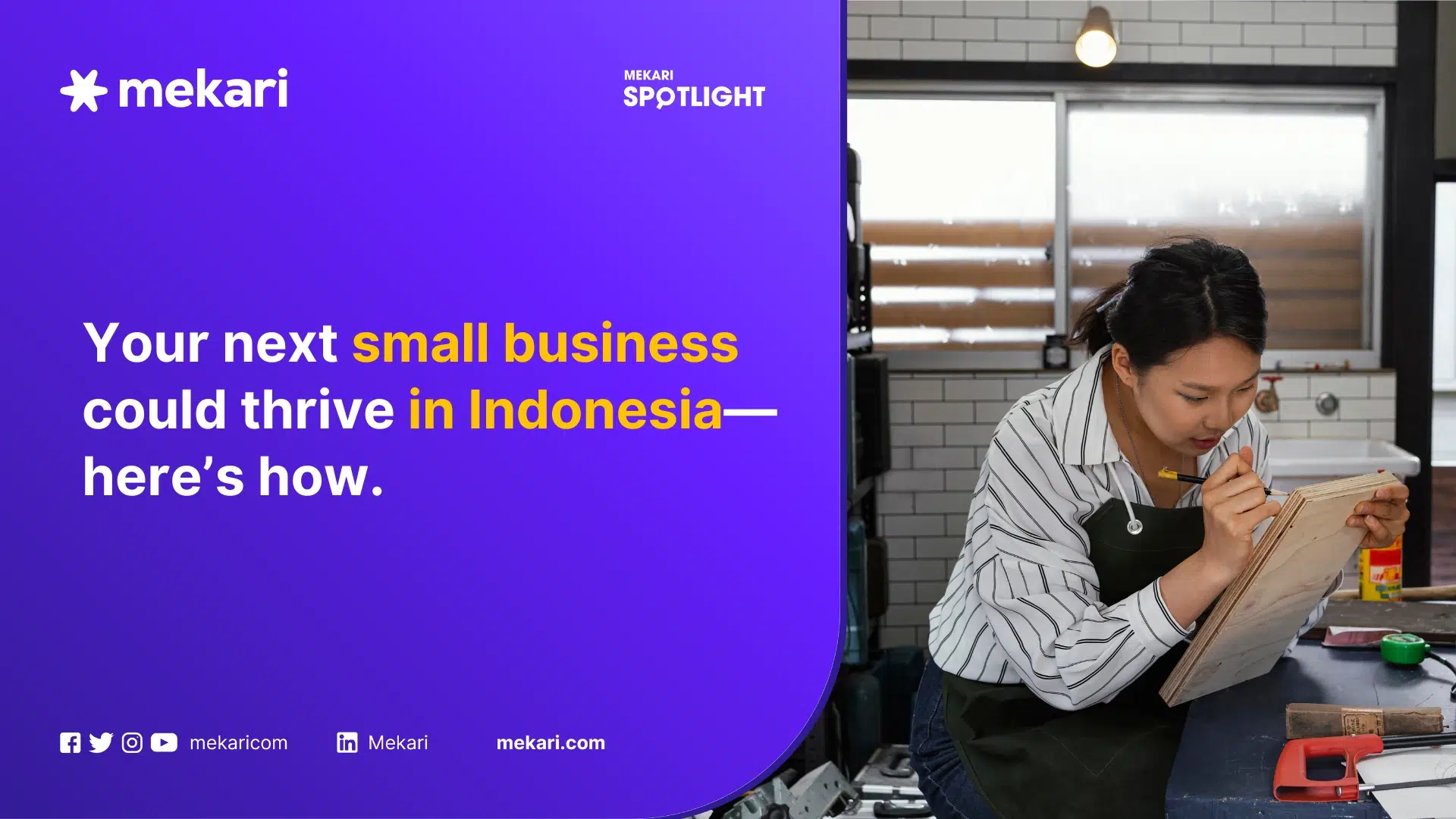Mekari Insight
- Indonesia supports small businesses with 100% foreign ownership in key sectors.
- Startup ideas range from tourism to tech to home-based services.
- Use integrated SaaS from Mekari to simplify business operations—manage payroll, taxes, HR, and more from one smart and integrated platform.
Indonesia’s economy is riding a strong upward trajectory—real GDP grew by 5.03 % in 2024, with buoyant private consumption fueling expansion. Foreign Direct Investment surged to US $55.3 billion, marking a 21 % increase from the previous year—driven by large inflows into mining, metals, and paper.
These figures reflect not only investor confidence but also an increasingly favorable environment for small business ventures, amplified by streamlined licensing and liberalized investment policies.
This article offers a curated list of the most promising small‑business opportunities in Indonesia—handpicked for both foreign and local entrepreneurs.
Requirements to start small business in Indonesia
Yes, foreigners are legally permitted to run small businesses in Indonesia, though certain sectors (like retail or land transport) impose caps on foreign ownership—typically up to 49%, under the Negative Investment List regulations.
Meanwhile, many industries—such as digital services, tourism, or tech, allow 100% foreign ownership.
1. Most common structure: PT PMA (Foreign-Owned LLC)

The go-to structure for foreign entrepreneurs is the PT PMA (Perseroan Terbatas Penanaman Modal Asing), a foreign-owned limited liability company. This vehicle mirrors a domestic LLC, offering full legal protection and the ability to operate commercially in Indonesia.
To qualify:
- Minimum total investment: IDR 10 billion (~US$600–700k), with at least 25% paid-up capital (~IDR 2.5 billion).
- Shareholders: At least two; can be foreign or domestic.
- Structure: Must appoint at least one Director and one Commissioner.
Read More: Foreign Company Registration in Indonesia: A Simple Guide2. Industry restrictions: Negative Investment List
Indonesia’s Negative Investment List specifies which sectors are off‑limits or capped for foreign ownership.
Industries like retail, transport, and land-based services typically cap foreign ownership at 49%, while numerous others remain 100% open to full foreign ownership. It’s essential to check your sector’s KBLI code against the latest Negative List.
3. Investor KITAS (Limited Stay Permit)
Foreign business owners may obtain an Investor KITAS, valid for 1–2 years (Index C‑313/C‑314), and renewable up to 5 years. It allows:
- Legal residency while managing a PT PMA;
- No IMTA (work permit) required—saves ~US$1,200 annually
- Freedom to work as Director/Commissioner within your company
- Inclusion of family dependents
To qualify, you must hold at least IDR 10 billion in the company, with 25% paid-up capital, and officially serve in a key corporate role.
10 top small business opportunities in Indonesia
Each idea connects with Indonesia’s unique economic trends—strong tourism, a surging digital market, and rising domestic consumption. They span diverse investment levels and operational scales, ensuring practical entry points for entrepreneurs.
1. Tourism & hospitality
Indonesia welcomed 13.9 million foreign tourists in 2024, marking an 18 % increase from 2023, while domestic trips surged to 1.02 billion, up 22 % year-on-year.
With tourism contributing nearly IDR 1,008 trillion (~US$67 billion) in 2023 and creating 12 million jobs , boutique hotels, eco-tours, and village homestays—especially around Bromo or Borobudur—are well-positioned.
These concepts offer moderate startup costs and high local engagement, with digital bookings increasing reach and efficiency.
Read More: Hospitality Procurement: Key Insights & Best Practices2. Food & beverage: street food & catering
Jakarta alone hosts over 56,000 street vendors, occupying sidewalks with affordable dishes under US$1–1.30. Low-cost setups—mobile carts or food trucks near offices and markets—can be tested quickly and expanded into event catering.
With minimal overhead and strong urban consumer demand, entrepreneurs can scale by mixing local favorites with fusion concepts, leveraging social media for exposure.
3. Agri‑processing & organic farming
Organic produce demand is climbing among health-conscious consumers, expats, and upper-end hotels. Ventures like hydroponic vegetables, fruit orchards, small cattle farms, and artisanal meat processing require modest land and equipment.
By directly selling to upscale restaurants or through e-commerce, producers secure higher margins. Branding, certifications (e.g., organic, halal), and farm-to-table storytelling enhance value and prices.
4. Digital & tech services
Indonesia’s digital economy, the largest in Southeast Asia, grew to approximately US$90 billion in GMV by end-2024 (+13 % YoY), projected to exceed US$130 billion by 2025, fueled by 79.5 % internet penetration and a young, tech-savvy populace.
Digital marketing agencies, app development studios, e-learning platforms, or niche SaaS targeting SMEs require minimal capital and can operate remotely. Success depends on niche focus, quality execution, and reliable client support.
5. Handicrafts & creative products
Indonesia’s handicraft exports reached US$679 million in 2024, with first-quarter wood and stone décor rising 8.2 % YoY to US$35.8 million . Supported by abundant raw materials—songket from Sumatra, ikat from Nusa Tenggara, rattan from Kalimantan—this sector employs many artisans.
Curating authentic pieces and selling through boutiques, online marketplaces, or pop-up stores can yield strong margins and sustainable income for artisans.
6. Home‑based services
Demand for home tutoring, elderly/childcare, and repair services is booming alongside Indonesia’s growing middle class. Between January and November 2024, Indonesians made 920 million domestic trips, highlighting mobility and service demand.
Starting from home with minimal tools, credentialed providers (e.g., language teachers in English/Mandarin, electronics repair) can build repeat client bases, expand services online, and introduce scalable models like group tutoring or remote consultations.
7. Micro‑retail & pop‑up stores
Small, targeted pop-up stores are thriving in malls and marketplaces, offering eco-friendly fashion, local beauty brands, or imported goods.
By cycling themes, leveraging social media buzz, and keeping inventory lean, entrepreneurs can minimize risk.
These ventures benefit from Indonesia’s upper-middle income status (per capita GDP ~US$4,000 PPP) and evolving consumer preferences toward sustainable and artisanal products.
8. Shared mobility & delivery services
Shared mobility and delivery services remain essential in urban hubs like Jakarta (metro population ~32 million).
Launching a small logistics firm using motorcycles or bikes—especially focused on B2B partnerships with restaurants, SMEs, or e-commerce sellers—can be profitable. Moderate investment in vehicles and a reliable tracking app, combined with punctuality and transparency, are key differentiators.
9. Health & wellness: fitness studio or spa
Wellness has gained traction post-pandemic. Boutique yoga studios, specialized fitness classes, or spas with Indonesian herbal treatments cater to local and expat needs.
Starting small (certified instructors, rented space), entrepreneurs can focus on niches—prenatal yoga, senior fitness, or healing therapies. Membership and package models deliver predictable revenue, while partnerships with corporates can boost client acquisition.
10. Packaging & light manufacturing
The boom in SMEs and e-commerce creates demand for eco-friendly packaging and small-scale manufacturing.
Producing biodegradable packaging materials, artisanal food items, or private-label goods for local brands requires initial investments in machinery and space.
With growing environmental awareness and government incentives for green manufacturing, this sector offers both profit and long-term viability.
Choosing the right small business opportunities in Indonesia

Selecting the right small business idea in Indonesia requires more than inspiration—it involves aligning your skills, financial capacity, legal knowledge, and market strategy.
Below is a breakdown of the key decision factors every aspiring entrepreneur should evaluate:
1. Fit to your background
Choose a business idea that aligns with your prior knowledge, experience, and cultural familiarity. For instance, if you have a background in IT, launching a digital agency or SaaS service will likely be more intuitive and efficient than starting an organic farm.
Understanding local customs, consumer behavior, and language nuances can give you a competitive edge—especially in people-facing businesses like hospitality, retail, or education. If you’re a foreigner, partnering with locals or hiring culturally attuned staff can help bridge gaps.
2. Capital & scale
Your initial investment budget determines the type and scale of business you can launch. Small-scale ideas like street food carts, tutoring, or drop-shipping can start with as little as IDR 20–50 million (US$1,200–3,000).
On the other hand, ventures like eco-tourism, boutique hotels, or PT PMA-based startups in manufacturing may require capital upwards of IDR 1–10 billion (US$60k–600k).
Think about:
- Can you self-fund or do you need investors?
- Do you plan to scale fast, or test with a minimum viable product?
- How quickly do you expect ROI?
Starting lean and reinvesting profits is a safer path for new entrants.
3. Ownership & legal security
Not all business sectors are open to full foreign ownership. Indonesia’s Positive Investment List (replacing the former Negative List) allows up to 100% foreign ownership in industries like tech, manufacturing, and tourism.
However, sectors like retail, construction, and land transport often limit foreign stakes to ≤49%, requiring local partners.
Always verify:
- Whether your business is in a restricted or open sector
- The minimum capital requirement (PT PMA mandates IDR 10 billion total investment)
- Whether local representation or a nominee is needed
Consult legal counsel or agencies like BKPM or Cekindo for up-to-date compliance.
4. Regulatory compliance
Many businesses in Indonesia require permits, certifications, and inspections before launching. These may include:
- NIB (Business Identification Number) and SIUP (Trade License)
- Halal certificates for food businesses
- Tourism operation licenses for travel agencies or accommodations
- Environmental permits for manufacturing or agri-related industries
Online systems like OSS (Online Single Submission) have simplified the process, but preparation still takes time and documentation. Non-compliance can result in penalties or shutdowns, so budget time and legal fees accordingly.
Read More: Payroll, Contracts & Employment Laws in Indonesia 20255. Market access & location fit
Market dynamics vary across Indonesia’s islands and cities. Urban centers like Jakarta, Surabaya, and Bandung favor tech-based services, fast food, and logistics.
Tourist destinations like Bali, Yogyakarta, or Labuan Bajo are better for hospitality, wellness, or cultural products. Meanwhile, agriculture thrives in Java, Sumatra, and Sulawesi’s rural zones.
Ask yourself:
- Where does your target customer live?
- Is demand seasonal, constant, or event-driven?
- Can you deliver in-person, online, or hybrid?
Location influences not just sales, but also supply chains, staffing, and licensing.
Conclusion
With a rising middle class, digital-savvy consumers, and a government that actively encourages entrepreneurship and foreign investment, Indonesia is full of opportunity for both local and foreign entrepreneurs.
However, choosing the right path requires more than just a good idea. It takes careful consideration of capital, legal structure, cultural fit, and market access.
Whether you’re starting lean with a food cart or going big with a PT PMA in tech or manufacturing, preparation is everything.
To streamline your journey, consider using integrated digital tools to help you manage finances, HR, taxes, and operations.
Integrated SaaS like Mekari offer smart, scalable business solutions tailored for growing enterprises in Indonesia. From accounting and payroll to CRM and compliance, Mekari can help you launch, manage, and grow with confidence.
With the right insights and the right tools, your business in Indonesia won’t just survive—it will thrive.

